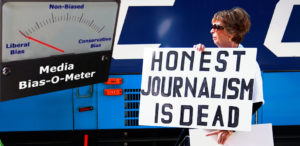by WorldTribune Staff, October 14, 2016
With their unapologetic coverage of the 2016 presidential campaign, The New York Times, Politico, CNBC, et al have ushered in the era of “consequence free journalism,” Evan Gahr wrote for The Observer on Oct. 24.
 “If you’re a Politico or New York Times scribe or CNBC anchor John Harwood and hacked emails emerge that reveal you outright colluding with Hillary Clinton campaign … your media friends will not censure you or even scold you — in fact, they don’t bother to contact you directly,” Gahr wrote.
“If you’re a Politico or New York Times scribe or CNBC anchor John Harwood and hacked emails emerge that reveal you outright colluding with Hillary Clinton campaign … your media friends will not censure you or even scold you — in fact, they don’t bother to contact you directly,” Gahr wrote.
Gahr described the runaround he received from Politico spokesman Brad Dayspring when Gahr asked to interview reporter Glenn Thrush about his newly revealed emails showing collusion with Clinton’s campaign.
The leaked emails reveal that Thrush apologized to Clinton campaign chairman John Podesta for writing a “shitty” story that embarrassed the operation. In another email, Thrush called himself a “hack” and promised to let Podesta approve parts of his story on the campaign’s fundraising efforts.
“No worries Because I have become a hack I will send u the whole section that pertains to u,” Thrush wrote. “Please don’t share or tell anyone I did this. Tell me if I f—ed up anything.”
Dayspring did not answer a single factual question about Thrush, Gahr said, but did call him one of the “top political reporters in the country.”
“Really? Top reporters theoretically treat both sides equally,” Gahr wrote. “Has he ever given Republicans advance copies of stories? If so, who?”
The New York Times displays “similarly situational ethics,” Gahri wrote.
“Hot shot New York Times magazine writer Mark Leibovich, himself embarrassed by a leaked email in which he told Hillary Clinton communications director Jennifer Palmieri she ‘could veto what you didn’t want’ from his interview with the candidate and omitted at her request dicey comments about Sarah Palin, recently defended his actions. But from the safe confines of his computer.
“Leibovich claimed he recently did the same kind of thing with Trump — unlike just about every politician or organizational official in Washington does — refuses to answer questions about his self-serving spin. The voice-activated phone system won’t connect callers to Leibovich — even though just about everybody else, including the bureau chief, can be reached the same way.
“An actual person who subsequently answered the main phone line started interrogating a caller — where do you work? what is this about? — who asked to be connected to the great man himself.
Alas, saying more or less the following did not do the trick. “What difference does it make who I am? Maybe I work at the ape house at the National Zoo. At the very least I’m a reader, right? Isn’t the Times supposed to be accountable to readers?”
Gahr continues that “consequence free journalism extends way beyond newly-revealed emails. In August, Washington Post scribe Janell Ross outright lied about Donald Trump — not shaded things or omitted things but outright lied — in order to depict him as some kind of crypto-racist. On the same day that Trump disavowed (David) Duke on ‘Good Morning America’ Ross wrote he had not done so in 48 hours, contradicting the paper’s own fact checker.
Asked to justify herself by Gahr, Ross said “the claim was merely her perspective and quickly hung up. Moral of the story: hot shot journalists don’t need to worry about anything they put in writing — privately or publicly — even when they outright lie about Donald Trump.”
